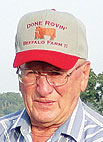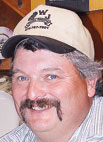
While a young man, Larry Hacker worked for a poultry company and met a farmer’s daughter named Nelda. Larry said, “At the time she was still a freckle-faced kid in the eighth grade but soon turned in to the beautiful young woman I married.”
The Hackers currently have a Beefalo breeding stock farm outside Lincoln, Ark. They currently run 50 momma cows and one bull but are looking to expand to 75 mommas on recently acquired additional acreage.
Larry was career military as a finance officer in the Army when the couple purchased their first two heifers from someone they knew. They wanted to find out if raising cattle was a good option for them after the military. Those heifers happened to be Beefalo which they bred to a really good Beefalo bull. The result was two nicely developed, even-tempered bull calves that sold right away as breeding stock. Larry said, “We didn’t plan on being Beefalo producers, but that first success made it seem so easy. Of course, in the long run it wasn’t, but the Beefalo proved to be very gentle and easy to work with.”
Beefalo are a cross between Buffalo and regular cattle with the only cows willing to accept a Buffalo bull being Charolais, Hereford and Holstein. Because Buffalo are highly temperamental and difficult to work with, the Hackers only work with Beefalo bulls and are known for their gentle offspring. Larry attributes their temperament to constant handling. Almost all of the animals are halter broken and brushed regularly. Larry said, “I go out with a brush every day and some animals track me down to make sure they get brushed daily. If you spend time with your herd, they want to spend time with you. It’s that simple.”
Larry believes that word-of-mouth reputation is everything in any agricultural business. He bought his first heifers by word-of-mouth, sells meat locally by word-of-mouth and sells the vast majority of his breeding stock by word-of-mouth reputation. Larry said, “Even when I point out that there is a breeding stock producer closer to potential customers, they buy from me because of that reputation.” Larry’s customers are from many states from the Rockies east to the ocean. Part of that reputation comes from attending two national shows and some more local shows with his prize-winning stock. They have won all of the major shows once or twice.
Another part of his reputation comes from a belief in youth outreach. Since the 90s he has helped young people who would not otherwise have any opportunity to be around farm animals to learn to work with and show Beefalo. More than 50 young people have earned numerous ribbons and trophies. They are excited with the process and help name animals, coming each year with lists of names for bulls and heifers making sure they start with the letter of that year as determined by the Beefalo Association. Because all of the Hacker animals are registered, they all must have names.
Beefalo produce low-fat, low-cholesterol meat which is in very high demand and due in part to, according to Larry, baby boomers reaching an age where fat and cholesterol are an issue and to a general awareness among the broader population of the importance of healthy foods including low-fat meats. Beefalo meat is comparable to skinless chicken or fish in cholesterol, which makes it extremely popular among those with heart issues.
Larry added, “I raise beefalo because I want to help other people get started raising them too which is why I don’t have enough to sell meat at the farmers market but only to locals by word-of-mouth. I wish we could do more.”
Larry also pointed out that obtaining additional high-quality breeding stock is difficult because demand is so high. He uses mostly natural cover breeding but will occasionally AI in order to introduce new bloodlines into the herd. He also will sometimes buy new heifers for the same reason. One of the advantages of the Beefalo is hybrid vigor, in this case not only between breeds but between species. This makes for a healthy, disease and problem resistant animal.
The breed has one disadvantage. One is that they do not breed true to color which Larry found out when he unsuccessfully tried to produce an all red herd. For Larry, however, the color variety is an advantage because different parts of the country prefer different colors.







